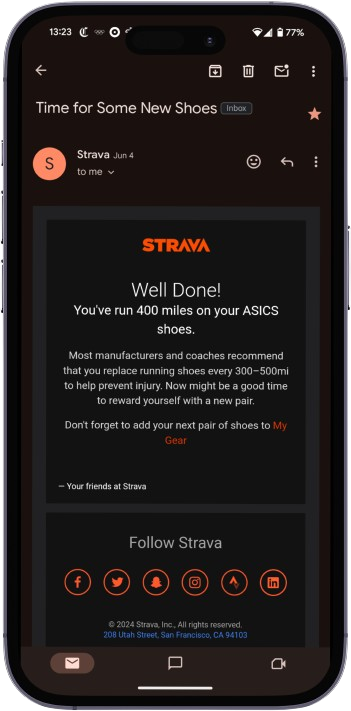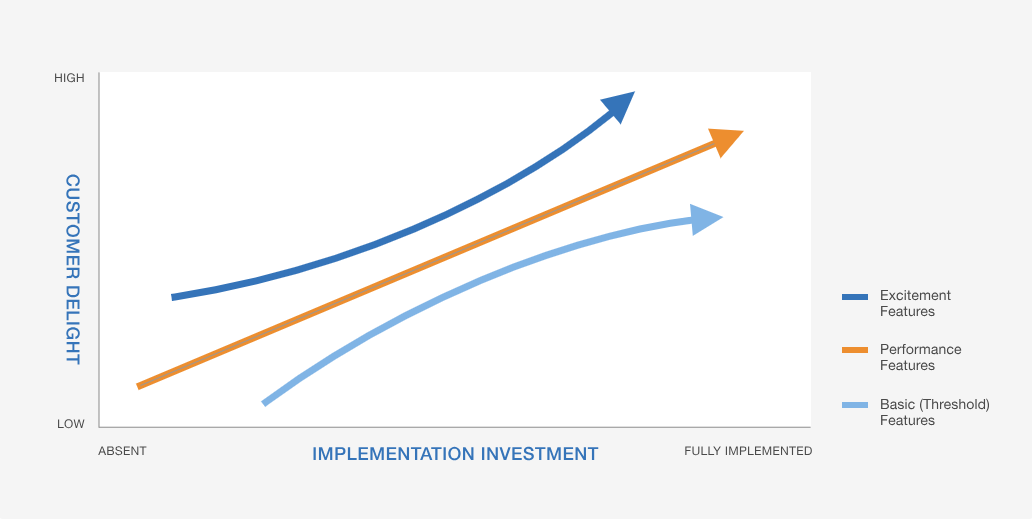
I’ve been tracking my runs and rides on Strava since February 2012, but I have to say that my favorite feature is a little, quiet one: The Shoe Mileage Tracker.
Easy peasy:

…and now you’ve got a data-informed justification for purchasing the new kicks:

Actually, this is nontrivial to me, because I’ve had my share of running-related knee and shin and foot injuries, some of which were attributable to going too far in shoes whose midsoles I’d already stomped out.
So, it’s a valuable insight. And the mechanism is a convenient one, since the alternative to this tracker is some kind of manual tracking, which, honestly, ain’t gonna happen.
Ergo, high user value (at least for me) + $0 (included) = delighter feature per the Kano Model; a useful, albeit not-terribly-quantitatively-rigorous framework.

I admit: actionable insights is pretty hackneyed—not to mention redundant—but if these bad boys hit the mark (in terms of some combination of targeting, timing, relevance, utility), they’re gold from a user experience and customer satisfaction perspective.
The Shoe Mileage Tracker fits into this category: i.e., information derived from some set of data that may be useful to the user for some decision or action. Although, a key difference is that I had to proactively enable the shoe mileage tracking (in the same way you might set an alarm), whereas other apps in other situations will serve up a notification or message unsolicited, which could land anywhere on the continuum between annoying spam and delightful insight-nugget, depending on how I receive it.
The email marketers over at Credit Karma have taken the unsolicited approach—and done it well—for quite some time (despite dealing with boring subject matter). Here’s a good example from them:

#1 bam—they hit you right between the eyes with the insight:
Hey Paul, we noticed your JPMCB CARD card balance has gradually gone down these past three months.
#2 But why I should care and what’s the context here, Man?
Creditors love to see this kind of pattern, because it shows that you can make your monthly payments.
#3 The summoning (call to action):
In the meantime, head to Credit Karma for a closer look.
Truth be told, it’s hard for me to care about this particular insight, but the point is that the template works. And this is probably just algorithmic (i.e., query users of x, y, z demographics whose card balance has decreased by a certain percentage or absolute dollar amount for three consecutive months), but imagine how much more powerful (relevant, interesting) these will be once AI models can perfect them.
As I say, AI is going to take this to the next level, and it may be that algorithmic insights won’t cut it forever. In fact, they may well move down the Kano curve from delighter to basic feature—or worse, the “indifferent” category—because of new trends that will raise the bar like, for example, hyper-personalization (tidbits even more tailored to me) and predictive/prescriptive insights (what’s my best course of action based on how the model forecasts the future).
But I’d say there’s plenty of runway left for the crude insights, so keep going, Shoe Mileage Tracker Product Manager 🫡
— ᴘ. ᴍ. ʙ.